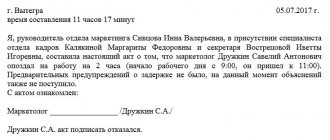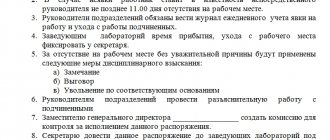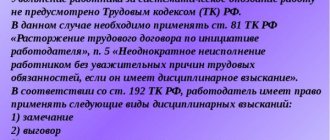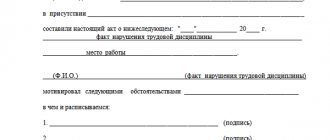Author of the article: Yulia Kaysina Last modified: January 2021 4952
According to Art. 21 of the Labor Code, an employee must not only fulfill his job duties, but also observe labor discipline. If an employee refuses to do this, the employer has the right to fire him. Depending on the severity of the offense and specific circumstances, dismissal for violation of labor discipline may follow even after a single failure to comply with norms and rules.
What is work discipline?
Important! Please keep in mind that:
- Each case is unique and individual.
- A thorough study of the issue does not always guarantee a positive outcome. It depends on many factors.
To get the most detailed advice on your issue, you just need to choose any of the options offered:
- Use the online chat in the lower corner of the screen.
- Call: Federal number: +7 (800) 511-86-74
When an employer talks about dismissal for systematic violation of labor discipline, he means the employee’s failure to comply with the requirements of Article 189 of the Labor Code of the Russian Federation. It stipulates that the responsibilities of the parties to the employment agreement include strict compliance by hired persons with the internal regulations of the enterprise, as well as the creation by the employer of the most favorable conditions for this.
The rules of conduct for employees within the enterprise during working hours cover a fairly wide range of issues:
- operating mode;
- hiring and firing procedures;
- localization of jobs (in the meaning of Article 209 of the Labor Code of the Russian Federation);
- the main duties and responsibilities of the parties;
- conditions for bonuses and penalties;
- other significant aspects of labor relations.
A wide range of issues related to the concept of labor discipline allows almost any employee’s misconduct to be subject to disciplinary punishment.
Explanatory note and order from the manager
Firstly, before applying “sanctions” you must require an explanatory note from the employee. He has the right to write and submit it within two days. The two-day period will have to be met in any case, even if the offender immediately refused to provide you with an explanation. What if he changes his mind? By the way, the request for clarification must be sent to the employee in writing. A verbal demand has no meaning from the point of view of labor law.
Secondly, disciplinary action must be documented. No officially issued order – no violation. Small business owners often neglect what they consider unnecessary “paperwork,” but this can lead to big problems with particularly harmful staff units.
It is not enough to accept and print an order to impose a penalty. It is necessary that the offender himself signs for its receipt.
If, after reading the document, the employee refuses to sign, you will have to immediately draw up a corresponding act. This act, confirming the “rebellion” of the violating employee, must be signed not only by you, but also by at least one other employee of the company (the head of the department where the insolent employee works, his colleague or other official).
Types of labor discipline violations and grounds for dismissal
There is no exact list of situations that clearly qualify as a violation of work discipline in the Labor Code. When determining the reason for an unplanned settlement, it is customary to conditionally divide all offenses into one-time gross and systematic ones, occurring constantly or at least twice.
Immediate termination of the employment contract will provoke: absenteeism or long-term (more than 4 hours in total per day) absence from the workplace, being at work under the influence of alcohol or drugs, theft or causing harm to the enterprise, as well as deliberate failure to comply with labor protection requirements. A correctly documented fact, even a single, similar action by an employee will entail the appearance in his labor report of clause 6 of Article 81 of the Labor Code of the Russian Federation.
A little longer, the employer will tolerate deliberate disregard of official duties. In order to get rid of an irresponsible employee, management must record at least two cases of laziness on the part of the hired person within 365 days. In this case, you can apply clause 5 of Article 81 of the Labor Code to the employee and dismiss him for systematic violation of labor discipline.
Employer's actions
Before a final verdict is made, the owner may require an explanatory statement from the employee. After this, the report must be drawn up by the head of the department or division. Based on these documents, an order is issued, which must be read by the dismissed person against signature.
The order is drawn up according to the accepted model - form T8 or T8a (used for the simultaneous dismissal of two or more persons). It should contain the following information:
- information about the institution;
- date and number of the document;
- detailed information about the employee;
- date of signing the employment contract and date of termination;
- the article under which the employee is dismissed and the offense committed by him.
The order is accompanied by explanatory and reporting notes, as well as a drawn up act describing the recorded labor violation. The legislation allows a period of 1 month for the implementation of the manager’s decision, however, in some cases, termination of the contract is allowed immediately. Refusal to resign from office is recorded in a separate act. A fired person cannot claim severance pay. He is entitled only to wages for the time worked and compensation for unused vacation.
The Labor Code, as amended in 2021, prohibits businesses from collecting compensation from an employee, even if his actions caused significant material damage to the company. But at the same time, the law leaves the possibility of turning to the judicial authorities to demand compensation for losses.
Responsibility for violations
Parting with an employee under the article for repeated violation of labor duties is, rather, a way of influencing employees. More often, to restore order in the team, the employer resorts to more loyal types of punishment. Article 192 of the Labor Code of the Russian Federation, in addition to dismissal for non-compliance with labor discipline, as the strictest penalty, provides two more types of punishment:
- remark (for non-serious cases, which, nevertheless, cannot be ignored);
- reprimand (for more serious offenses that entailed negative consequences, or required a lot of effort and money to correct them).
The employer has the right to apply any of them if the employee’s guilt is proven and the method of influence is proportionate to the gravity of the crime, Art. 192 TK. Moreover, management is free to choose a less severe punishment for the employee, or may refuse it altogether, Art. 193 TK. The director’s competence also includes the early removal of a previously imposed penalty, Art. 194 Labor Code of the Russian Federation.
Dismissal procedure
Any violation must be considered on its merits, taking into account all mitigating and exculpatory circumstances. Article 192 of the Labor Code of the Russian Federation calls the employer to do this. If the employee’s guilt is undeniable and management is not inclined to stand on ceremony with the offender, personnel officers will have to go through the difficult formal path of preparing documents for dismissal for failure to comply with labor discipline. And in order not to replenish the archive of judicial practice in favor of the employee, you must not skip a single step.
Certification of the fact of violation
Recording an offense is the starting point for applying any disciplinary sanction. The employer’s confidence that the employee will not be able to challenge the legality of dismissal for violation of labor discipline depends on how completely and objectively the procedure is carried out:
| Type of violation | Fixation method | Employee's counterarguments |
| Absenteeism or absence from work for more than 4 hours | An absence from work certificate signed by at least two witnesses. It must be taken into account that the people who signed must have the opportunity to personally verify the person’s failure to appear or constant absence from the workplace. | The most common shield for an employee is a certificate of sudden illness or sick leave. In the first case, the absence will not be paid, but dismissal can be avoided. Any document confirming the unforeseenness and urgency of personal circumstances will also help justify the case. |
| Late | The same act, but for dismissal there must be several of them. You need to understand that management will not be able to kick an employee out for systematic tardiness without additional evidence. | The reasons for being late can be very different, but the employee must provide a convincing explanation for each of them. A broken lock, a malfunctioning elevator, an illness in a pet, or a burst pipe can evoke sympathy from your boss. At the same time, regular late appearance at work for any reason is a direct way out. |
| Refusal to comply with labor safety rules | A memo from the responsible employee or an accident report at the enterprise | The employee must report the impossibility of work and a threat to health to the supervisor before starting work. If this was the result of management shortcomings, then the dismissal of the employee is considered illegal, Art. 220 Labor Code of the Russian Federation. |
| Theft or damage to property | A written statement to the police, independent recording of the fact of damage with the involvement of witnesses and further internal investigation | An employee will be able to protect himself not only from dismissal, but also from the obligation to reimburse material costs, if he proves that the valuables were not transferred to him for safekeeping legally. The absence of a financial liability agreement signed by the employee will also help. |
| Appearing in a state of any kind of intoxication | A report from the immediate superior and a medical examination or a written refusal to visit the hospital. | Stubborn refusal to draw up or sign any documents will work against the employee. The management will simply draw up a notice of refusal and lawfully dismiss the employee. If the cloudy state is not related to the use of strong drinks, it is necessary to prove that the inadequacy of the reaction arose as a result of a sharp deterioration in health. |
Real life situations can go far beyond the standard options. The main thing when preparing documents is objectivity, as well as the involvement of disinterested witnesses and experts.
Issuing a warning to an employee
Even if the situation is interpreted unambiguously and, in the employer’s opinion, the employee deserves the most severe punishment, it will not be possible to apply it without an explanation from the employee. The law obliges the employer to request them from the offender in writing, Art. 193 Labor Code of the Russian Federation.
There is a generally accepted form asking the employee to prove his innocence, but you can make your own changes to it if this applies to what happened. If the employee refuses to receive the request, then it must be read out loud and the refusal must be confirmed by the signatures of witnesses. Or formalize this fact in a separate act.
Preparation and receipt of an explanatory note
The employee is given two working days to substantiate the unintentionality of his actions or prove the occurrence of insurmountable circumstances. During this time, he can obtain the necessary certificates, seek advice from a lawyer, or simply state the reasons for his behavior.
Often the employer demands urgent writing of an explanatory note or threatens immediate dismissal. In this case, the employee should not rush or be afraid: the management is not able to influence the deadlines. But in order for management not to succumb to the temptation of quick reprisal, the employee must receive a copy of the demand against his signature, and when handing over the explanatory note to the director, make him sign on the second copy.
Consideration and assessment of the fact of violation
Since dismissal for failure to comply with labor discipline is an extreme measure, decision-making often occurs collectively. It would be better if the boss’s conclusions were confirmed by members of a specially created commission. If an employee is a member of a trade union, then taking their opinion into account is also indispensable.
Individual adoption of radical measures threatens the employer with inspections by labor inspectors, the prosecutor's office, and, in the worst case, a court decision not in his favor.
Order of dismissal for violation of labor discipline
The final act, in an unfavorably developing situation, will be an order of dismissal. You can take the unified T8 form as a sample. The only difference from the standard order to terminate an employment contract will be the basis for the calculation - the mention of one of the paragraphs of Article 81 of the Labor Code of the Russian Federation.
Step-by-step procedure for dismissal for failure to fulfill job duties
One of the grounds for dismissal at the initiative of the employer is dismissal due to repeated failure to fulfill job duties, if the employee has a disciplinary sanction (clause 5, part 1, article 81 of the Labor Code of the Russian Federation). However, when terminating an employment contract on this basis, the employer often makes mistakes, due to which the employee can be reinstated in his previous position. In this article we will consider in detail the procedure for dismissing a negligent employee, and also focus on its individual points.
Instead of a preface
Naturally, the employee must be familiarized with his responsibilities by signature. In particular, Art. 68 of the Labor Code of the Russian Federation requires the employee to familiarize himself with the internal labor regulations, other local regulations directly related to the employee’s work activity, and the collective agreement. From this we can conclude that if the employment contract only stipulates the name of the position or profession (type of work), but does not specify the functions, and the employer forgot to familiarize him with the job description, then bring him to disciplinary liability for failure to fulfill labor duties (and even more so dismiss him). under clause 5. part 1 of article 81 of the Labor Code of the Russian Federation ) will be very problematic. This conclusion is confirmed by judicial practice. Thus, the Perm Regional Court, in its Ruling dated May 14, 2014 in case No. 33-4192 , declared the orders to impose a penalty illegal and reinstated the employee in his previous position, and also recovered wages for the period of forced absence and compensation for moral damage due to the fact that in the absence of an official instructions and official familiarization with one’s official duties, it is impossible to establish the scope of the plaintiff’s duties and impute to him failure to fulfill duties.
Can being late for work be considered a failure to fulfill job duties? Yes, you can. The State Labor Inspectorate in St. Petersburg explained: since the employee is obliged to comply with the internal labor regulations, being late can be considered a violation of labor discipline, for which the employer has the right to bring the employee to disciplinary liability, and in case of repeated lateness, even dismiss him.
In addition, according to paragraph 35 of Resolution No. 2 , failure by an employee to perform without good reason is failure to fulfill labor duties or improper performance through the fault of the employee of assigned labor duties (violation of legal requirements, obligations under an employment contract, internal labor regulations, job descriptions, regulations, employer orders, technical rules, etc.).
Such violations, in particular, include:
a) the employee’s absence from work or workplace without good reason;
b) refusal of an employee, without good reason, to perform labor duties in connection with a change in labor standards in accordance with the established procedure ( Article 162 of the Labor Code of the Russian Federation ), since by virtue of an employment contract, the employee is obliged to perform the labor function specified in this agreement, to comply with the internal labor rules in force in the organization regulations ( Article 56 of the Labor Code of the Russian Federation ).
We also note that dismissal under clause 5, part 1, art. 81 of the Labor Code of the Russian Federation is a measure of disciplinary liability, which means that the employer is obliged to comply with the procedure for bringing such liability established by Art. 192 , 193 Labor Code of the Russian Federation .
Thus, the Plenum of the Armed Forces of the Russian Federation in Resolution No. 2 indicated: when resolving disputes of persons dismissed under clause 5 of part 1 of Art. 81 of the Labor Code of the Russian Federation for repeated failure to fulfill labor duties without good reason, it should be taken into account that the employer has the right to terminate the employment contract on this basis, provided that a disciplinary sanction was previously applied to the employee and at the time of repeated failure to fulfill work duties without good reason, it has not been lifted and not repaid.
Let us note that if the disciplinary sanction is lifted or the employee violated labor discipline for the first time, then dismissal under clause 5 of part 1 of art. 81 of the Labor Code of the Russian Federation will most likely be declared illegal. For example, the Moscow Regional Court, having reinstated the employee at work, indicated that the dismissal procedure was violated, since the employee violated his job duties once, that is, there was no repetition ( Appeal ruling dated 06/04/2014 in case No. 33-12256/2014 ).
According to Part 2 of Clause 33 of Resolution No. 2, the application of a new disciplinary sanction to the employee, including dismissal under Clause 5 of Part 1 of Art. 81 of the Labor Code of the Russian Federation , is also permissible in the event that non-fulfillment or improper performance, through the fault of the employee, of the labor duties assigned to him continued, despite the imposition of a disciplinary sanction on him.
note
It should be borne in mind that the employer has the right to apply a disciplinary sanction to the employee even when, before committing the offense, he filed an application for termination of the employment contract on his own initiative, since the employment relationship in this case is terminated only after the expiration of the notice period for dismissal.
Time limits for dismissal
The mere fact of a gross violation of discipline does not predispose the authorities to show patience with the offender. Therefore, dismissal as a disciplinary measure is not long in coming. But if the situation requires consideration or investigation, then the employer must remember that the law gives him only thirty days from the moment the offense was discovered, Art. 193 Labor Code of the Russian Federation. This means that management will not be able to threaten dismissal and keep the employee in constant tension. The law insists: either a proportionate punishment within a month, or complete forgiveness of the offense.
Those employees who plan to hide from the wrath of management on vacation or on sick leave should know that these periods are excluded from the period allotted for making a decision on the fate of the negligent employee, Art. 193 Labor Code of the Russian Federation. That is why, after a sudden exacerbation of chronic illnesses, no matter how long it lasts, the hired person will have to give written explanations about the reasons for his behavior.
There is one more restriction: you cannot punish for a violation that is discovered six months after it was committed. This period is extended only for those events that can only be discovered through an audit or through the involvement of auditors. Then the collection may occur two years later.
Trial
A person who has lost his job can file a claim in court. If, in his opinion, the boss’s actions were absolutely illegal and unlawful, he can demand that the decision on dismissal and reinstatement be canceled. In some cases, the court does take the side of the injured party, but each case must be considered individually.
Controversial issues that may affect the course of the proceedings are:
- incorrect procedure for recording violations and absenteeism;
- the information indicated in the report is unreliable (often management overestimates the time of lateness or absence);
- absence of a written request from the manager to provide an explanatory note.
Failure to comply with the deadlines established by law is also considered a gross violation. If more than 1 month has passed since the date of the offense committed, which was known to management, the statute of limitations is considered expired. When the court satisfies the plaintiff’s demands, the employer will be obliged to reinstate him in his previous position. The period of absence is counted as forced downtime and is necessarily included in the length of service when calculating wages. An employee has the right to demand compensation for moral damage, as well as ask the director to transfer him to another branch or division.
The decision on what punishment to apply must be made by the owner, but his conclusions cannot contradict the law. To avoid conflict situations and properly fire a dishonest subordinate, you need to take into account all the nuances of the contract termination procedure. Otherwise, the court may take the employee’s side, even if he is truly guilty.
How is the calculation made and is it done?
Of course, dismissing an employee for failure to comply with labor discipline is not the most pleasant procedure, first of all, for him. However, this does not mean that a person can be deprived of everything he earned during the time he devoted to the company.
Whatever article is specified in the order to terminate the employment relationship, the employee has the right to:
- current salary;
- compensation for vacation (main, additional, special);
- reimbursement of overexpenditures on accountable amounts;
- bonuses for exceeding the norm, if established;
- payment for overtime hours and time worked on holidays and weekends;
- all bonus payments stipulated under a collective agreement or other local act, unless they are made dependent on the reason for dismissal.
An employer, wishing to punish an employee more severely, cannot refuse to issue timely employment documents, required certificates and copies. He is obliged to provide all other documents that the former employee may require in the future. When dismissing for violation of labor discipline, it is better to confirm your decision with the findings of the commission, the opinion of experts and coordinate this with the trade union, if there is one.
Calculation
On the last day, the employee must be paid the following:
- wages for the period worked;
- bonuses (if the employee is not deprived of these payments due to compensation for damage to the organization);
- compensation for unused vacation.
The listed payments are mandatory and provided for by law, so the employer cannot deprive the employee of the specified funds. An exception is a premium, which can be used to pay off damage caused to the enterprise (again, if this fact is proven).
The employee is not entitled to any additional payments.
What entry is included in the labor record?
The wording containing the dismissal order is transferred to the work book. Therefore, if there is a mention of absenteeism or alcohol intoxication, the employee is guaranteed to read the same on the pages of his work report. A brief explanation of the reasons for ending the relationship with a specialist will not be enough. The law determines that the employer must specify the clause and article of the Labor Code of the Russian Federation.
In case of dismissal for violation of labor discipline, it is necessary to make a record that the calculation was carried out in accordance with Art. 81 TK. But the subparagraph that will be indicated depends on the circumstances:
- paragraph 5 – repeated (systematic) failure to fulfill duties;
- paragraph 6 – one, but gross violation;
- paragraph 10 - in the event that the same actions are performed by the head of the enterprise or his deputies.









